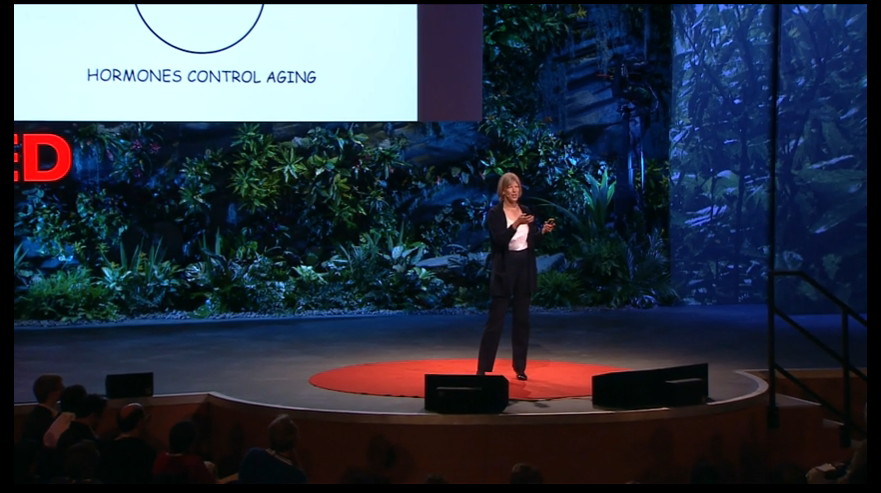
Let’s face it people; we’re all getting older. In fact, more years were added to the average life expectancy in the 20th century than all years added across all prior millennia of human evolution combined. You may think, “Oh great, more wrinkles,” but aging isn’t all bad!

Biochemist Cynthia Kenyon explains the link between aging genes and lifespans at a Global TedTalk conference in 2011.
Brilliant scientists have discovered a link between genes and aging. In this TedTalk, for example, biochemist Cynthia Kenyon explains a gene called daf-2. Scientists altered this gene in an experiment with a small worm and discovered it could double the lifespan of the worm.

This is a slide from Kenyon’s presentation showing how an experimental mutation in the gene called daf-2 caused the worm to live twice as long as the normal worms.
Can you imagine living until you’re 160 years old? Better yet, can you imagine looking like a 30-year-old when you’re in your 60’s?
Scientists have a ways to go before they discover how to slow the aging process in humans, but in the mean time there are still many things to enjoy and appreciate about growing older. Living longer means we have more time to achieve goals and experience what most people would consider to be full and meaningful lives.
The Paradox of Aging
As we finish packing away yet another Christmas season, don’t let the stress of new year resolutions steal your holiday high! Recent studies have discovered that older people are actually happier than middle aged and younger people.
A Gallup Poll conducted by the national academy of sciences in 2011 showed that stress, worry, and anger all decrease with age. Scientists call this phenomena “the paradox of aging”.
I think we can all agree that growing up is not a piece of cake. On one side of the aging coin there is disease, poverty, and loss of social status. On the flip side, however, age also brings increased knowledge and expertise. (I’m really looking forward to this.)
One study conducted by psychologist Laura Carstensen and her colleagues followed the same group of people over ten years to see how their emotional experiences changed as they grew older.

Psychologist Laura Carstensen discusses research that shows people become happier as they get older.
The findings from this study show that older people are more positive and more likely to experience mixed emotions. Carstensen also concluded from her research that older people usually feel happiness and sadness at the same time. They can have tears in their eyes when they smile.
This is significant because it goes to show that older people engage with sadness more comfortably and are more accepting of sadness than young people. They’re better at solving hotly-charged emotional conflicts and debates, and they can view injustice with compassion, not despair.
Learning How To Savor Life
Observing the passage of time is a unique human ability. Recognizing that we won’t live forever has the power to change our perspective on life in positive ways.
I’m sure many of you know from experience that when we’re young we take risks. We explore and even spend time with people we don’t like because it’s “interesting” and unexpected. We go on blind dates! But people over 50 don’t usually go on blind dates. (If you do then more power to you!)
The point is that our goals change over time. As we age and approach our final destinations, we see our priorities more clearly. We notice the trivial stuff less and we savor life. We’re more appreciative when a friend reaches out and more open to reconciliation. We learn which parts of our lives are more emotionally important, and life gets better. We’re happier day to day.
Don’t look at aging as a tumble down a steep and rocky hill, but rather a journey towards a happier, fuller, and more meaningful life. Live in the moment, figure out what’s important, deepen relationships, and learn how to savor life.
If you agree or disagree with Laura Carstensen and her colleagues that stress, worry, and anger all decrease with age, then please share your thoughts and questions with us in the comment section below!
Happy New Year!





